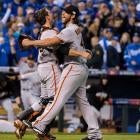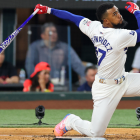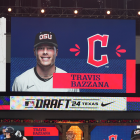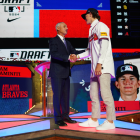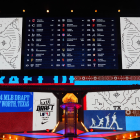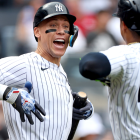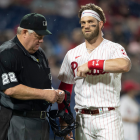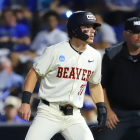Gregorian calendars agree: the decade of the 2010s is over. For baseball enthusiasts like the present company, that occasions an opportunity to look back upon the 2010-19 seasons and declare -- authoritatively, while wearing robes and magistrate's wigs -- MLB's best from the decade that was. We're here to do just that.
On a number of these forthcoming categories, we polled our MLB staff of writers -- Katherine Acquavella, R.J. Anderson, Mike Axisa, Dayn Perry, and Matt Snyder -- to arrive at consensus results. On others, we relied on the dealer's choice approach. By way of reminder, many of the awards to come reflect performance across the entire decade that was just completed, so no extra emphasis is being placed upon the more recent seasons. For those full-decade awards, it's about, well, the full decade.
Without further pomp, let us now unveil the winners of our All-Decade Awards for 2010-19. Since this is the internet, your meek and silent agreement with every choice is appreciated in advance.
Team of the Decade: San Francisco Giants
The Giants were the unanimous choice with our crack staff, which means one thing: rings matter. The Giants in the 2010s won the World Series three times -- in 2010, 2012, and 2014 -- which is more than any other squad. The thing, though, is that they weren't otherwise dominant and weren't the best regular season team in any of those championship campaigns.
So why not declare the Giants and their three belts and titles to be the team of the decade while not declaring them to be the best team of the decade? Why not indeed. To probe into this distinction a bit further, let's show you the top five team winning percentages for the decade that was:
| Rank | Team | 2010-19 winning percentage | 2010-19 Playoff appearances | 2010-19 World Series titles |
|---|---|---|---|---|
1 | Yankees | .569 | 7 | 0 |
2 | Dodgers | .567 | 7 | 0 |
3 | Cardinals | .555 | 6 | 1 |
4 | Nationals | .543 | 5 | 1 |
5 | Red Sox | .538 | 4 | 2 |
So if we go by the strict matter of which team won most often, then the Yankees are the best team. If we go with a blended approach, then it's probably the Red Sox, what with their fifth best winning percentage and status as the only other team to win multiple titles in the decade.
As for the Giants, they're 13th in winning percentage for the decade, just behind the Angels. Over that 10-season span, they're just 22 games above .500, which means they've averaged roughly 82 wins per season. Suffice it to say, that's not particularly close to "dominance." So, yes, the Giants are team of the decade thanks to those three championships, but the body of work is otherwise somewhat middling.
Player of the Decade: Mike Trout
This one was not a tough call. Trout of course is a plus center fielder who runs the bases well and puts up utterly tremendous numbers at the plate. For the decade -- i.e., for his career -- he's put up a slash line of .305/.419/.581, which comes to an OPS+ of 176. That figure leads all active players and is fifth on the all-time list. As well, Trout in eight full MLB seasons has won three AL MVP awards and finished second in the balloting on four other occasions. In his "worst" full season, he placed fourth in the vote.
Now let's turn to WAR, or Wins Above Replacement. While WAR has some flaws, it remains the best publicly available measure of a player's overall value. With that in mind here's a look the five highest WARs among position players for the decade that was:
| Rank | Player | Total WAR for 2010-19 |
|---|---|---|
1. | Mike Trout | 72.5 |
2. | Robinson Cano | 54.2 |
3. | Joey Votto | 52.1 |
4. | Adrian Beltre | 51.0 |
5. | Josh Donaldson | 44.8 |
So Trout leads all comers by almost 30 wins, which is a margin so huge that any marginal inaccuracies on the part of WAR are more than overwhelmed. Also note that he tops this leaderboard despite going into the 2012 season with just 0.5 WAR. Trout's 28, and he could retire today and be a Hall of Famer. That's how dominant he was in the 2010s, and that makes this award the easiest call of all.
Pitcher of the Decade: Clayton Kershaw
While Madison Bumgarner deserves a tip of the cap for his excellent postseason work and there was some excellent pitching done by the likes of Chris Sale, Cole Hamels, Zack Greinke and David Price, this one came down to three pitchers.
- Clayton Kershaw: 156-61, 2.31 ERA, 0.96 WHIP, 2,179 K, 434 BB, 25 CG, 15 SHO, 59.3 WAR, 3 Cy Youngs, 1 MVP
- Justin Verlander: 160-86, 3.10 ERA, 1.08 WHIP, 2,260 K, 568 BB, 20 CG, 6 SHO, 56.2 WAR, 2 Cy Youngs, 1 MVP
- Max Scherzer: 161-74, 3.12 ERA, 1.07 WHIP, 2,452 K, 534 BB, 10 CG, 5 SHO, 56.1 WAR, 3 Cy Youngs
Our vote was unanimous for Kershaw. Though Verlander and Scherzer are future Hall of Famers and had great cases, Kershaw was the consensus best pitcher in in the world for a majority of the decade. He led the majors in ERA four straight seasons and it could be argued he deserved more than three Cy Youngs. He finished second twice and third once. Only in 2010 (when he was seventh among NL pitchers in WAR) and 2018 did he not finish in the top eight.
Reliever of the Decade: Craig Kimbrel
Again, three stood head and shoulders above the rest. Aroldis Chapman and Kenley Jansen certainly have arguments here, but Kimbrel leads in WAR (19.6 to Chapman's 17.5 and Jansen's 15.8) and crushed the field in saves with 346 (Jansen was second at 301; Chapman third at 273).
Kimbrel posted a sparkling 2.08 ERA and 0.95 WHIP in the decade while striking out 41.1 percent of the hitters he faced, tying him with Chapman for the highest among pitchers who played a majority of the decade (only Josh Hader was higher overall).
It's tough for relievers to get Cy Young votes these days and rightfully so, but Kimbrel got votes five years, finishing fourth, fifth, sixth and ninth (twice). He even checked in at eighth in NL MVP voting in 2012.
Relief pitching is volatile and Darren O'Day ranking fifth in WAR for the decade bears that out, but Kimbrel, Chapman and Jansen were amazing for basically a whole decade with Kimbrel sitting at the top.
Manager of the Decade: Bruce Bochy
This one's an outgrowth of the Team of the Decade award explored above. Bochy was manager for all three of those Giants World Series titles, and that by extension earns him this honor. The decade of the 2010s took Bochy from a solid dugout leader who enjoyed some success with the Padres to a future Hall of Famer, and that's thanks to this troika of titles with San Francisco. We'll give a runner-up nod to Joe Girardi, who guided the Yankees to five playoff berths and eight winning seasons in as many years during the decade.
Defender of the Decade: Andrelton Simmons
Judging defense isn't quite as easy as offense but there continue to be advances in stats that will help, notably adding a component of range measurement to several different relatively new stats that came along and were more mainstream this past decade. Our defender of the decade checks all kinds of boxes both old school and new.
Simmons won the 2013 Platinum Glove and the 2015 Wilson Overall Defensive Player of the Year. He was the shorstop for Wilson Defensive Players of the Year six times.
Using defensive WAR on Baseball-Reference, Simmons racked up 27.3. Lorenzo Cain was second at 16.1 and only five players total were 15-plus. Simmons crushed the field despite only playing 1,030 games.
Using defensive runs saved, again, it's a blowout. Simmons saved 198 with Jason Heyward second at 141 and Alex Gordon third at 129. Only six players were above 100.
Anyone watch Simmons play on a regular basis? The eye test is still important and he checks out there as well. It's an incredible pleasure to watch him play defense.
All-2010s Defensive Team
Catcher: Yadier Molina
Salvador Perez deserves mention, but Molina has his reputation for a reason. He was the gold standard in the decade.
First base: Anthony Rizzo
Rizzo won a Platinum Glove thanks to his excellence at picking balls out of the dirt, his penchant to make great catches in foul territory and more, but no one covers bunts and nails runners at third like him. Paul Goldschmidt and Joey Votto merit mention here as well.
Second base: Ian Kinsler
The Rangers hit the national spotlight early in the decade and a big part of that was their infield defense with Adrian Beltre and Elvis Andrus on the left side. Kinsler was arguably their best, though. For the decade, he was fifth in defensive WAR and sixth in defensive runs saved. The eye test confirms it.
Third base: Nolan Arenado
This was a really close call. Both Manny Machado and Adrian Beltre are all over the leaderboards and at other positions would get the nod, but Arenado gets them by a nose. Josh Donaldson and Evan Longoria aren't far off and more time from Matt Chapman would've made this a lot tougher. This is the golden age of defensive third basemen.
Shortstop: Simmons
This wasn't even close, but that's not a knock on anyone else like Brandon Crawford or Francisco Lindor. Simmons is just that good.
Left field: Alex Gordon
Remember that Royals outfield defense with their back-to-back pennants? It was amazing to watch. Gordon was a huge part of it. He won seven Gold Gloves, including a Platinum, in the decade.
Center field: Lorenzo Cain
If we could name the smoothest defender, give it to Lo. He chased balls down all decade and made it look easy. His tendency to camp under warning track flies in trolling fashion so you can't tell if it's a home run or flyout is only the cherry on top. Apologies to Kevin Kiermaier, who was almost equally deserving.
Right field: Jason Heyward
Heyward's exceptional glovework is a big reason he got such a huge payday with the Cubs. As noted above, only Simmons saved more runs on defense than Heyward.
Pitcher: Zack Greinke
Many people don't realize just how exceptional an all-around athlete Greinke is. With apologies to Dallas Keuchel, Greinke was the best defensive pitcher in baseball this past decade and he can also rake at the plate.
Best Day: Sept. 28, 2011
Generally speaking, we're gonna guess it's usually not so easy to pick the best day of a decade, but this one came to us easily.
On the AL side, the Red Sox actually had a two-game lead in the AL East through Aug. 27. The Rays were nine games behind them, seven back of the Yankees for the lone wild card spot in the AL.
On the NL side, after a loss on Aug. 24, the Cardinals were just four games over .500 and 10 1/2 games out of the NL wild card with a team in between.
The Braves and Red Sox both collapsed in September while the Rays and Cardinals surged, so both wild card spots were tied going into the last day of the season. The Cardinals won in a blowout and it looked like they were going to have a one-game playoff with the Braves, but the Phillies tied it against Craig Kimbrel in the ninth in Atlanta and then prevailed in 13 innings to eliminate Atlanta.
Meantime, within minutes of each other, the Rays staged an amazing comeback win with an Evan Longoria walk-off homer. It was followed by Jonathan Papelbon blowing a save against a terrible Orioles team. It was unreal.
Here's the footage:
The Cardinals would go on to win the World Series, too.
Best comeback (game): Dodgers vs. D-Backs, 2011
Yep, 2011 once again. Going into this Tuesday evening tilt at Chase Field, the Diamondbacks were fresh off a surprising clinch in the NL West, and the Dodgers were on their way to an 82-win season. In those senses, this one didn't matter much. Starters Hiroki Kuroda and Jarrod Parker blanked the opposing lineups for the early innings, and then game went into the 10th tied 1-1.
In the top of the 10th, the Dodgers battered reliever Micah Owings for five runs to a take a commanding 6-1 lead. Assuming the game was lost, Arizona manager Kirk Gibson removed star left fielder Justin Upton for Cole Gillespie just to be sure his slugger didn't get hurt in a lost cause of a game. In the home half of the 10th, Willie Bloomquist and Gerardo Parra each grounded out against Blake Hawksworth. At the point, the Dodgers had a 6-1 lead with no one on base and were one out away from a win. That translated to a 99.6 percent chance of winning the game. Gillespie, though, kept the dream alive with a ground ball single. Another single followed, and then came a walk and an error. Then came another walk.
At that point, the Dodgers were still up 6-3 with the bases loaded and two outs, which still gave them an 83 percent chance of winning. Unfortunately for L.A., Fightin' Ryan Roberts was on the case:
Yeah, note the tribute to his manager's legendary home run in the 1988 World Series. This game wasn't all that important, but in terms of raw probabilities it's one of the biggest comebacks in MLB history.
Biggest play: Freese's World Series triple
No, we're not quite done with the cavalcade of baseball miracles that was 2011. It's Game 6 of the 2011 World Series. The Rangers lead the Cardinals in the best-of-seven affair, 3-2. When St. Louis third baseman David Freese stepped in to face Neftali Feliz in the bottom of the ninth, and the Cardinals trailed, 7-5, with two out and two on. When Felix ran the count to 1-2, the Rangers were one strike away from winning the World Series for the first time in franchise history, and they had roughly a 92 percent chance of doing so. You probably know what happened next:
The Cardinals went on to win Game 6 on an 11th inning walk-off homer thanks to, fittingly enough, Freese. The Red Birds then prevailed in the decisive Game 7. The Freese triple above, though, is truly the knock that reversed the fortunes of both teams.
You're probably familiar with win probably added, which in part tells you how much a given play increases or decreases a team's chances of winning a game. There's also a thing called championship win probability added (cWPA), which tells you how much a play increases or decreases a team's chance of winning the entire stuffed crust pizza -- i.e., the World Series. Freese's triple -- given that it tied the game and came when the Cardinals were on the brink in an elimination game -- moved the needle in a huge way. Specifically, Freese's three-bagger increased the Cardinals' chances of winning the trophy by more than 30 percent, which is a massive figure. It wasn't quite the highest cWPA of the decade, but its role in one of the greatest games in MLB history can't be ignored.
Best comeback (season): 2019 Nationals
Hey, let's make time for the current champs. The Nationals barged to the World Series title this past season, but for a while such a thing didn't seem possible. After a loss to the Mets on May 23, the Nats dropped to 19-31 on the year. They were in fourth place in the NL East, and their opponents had outscored them by 40 runs. They were 10 games out of first place and behind nine teams in the chase for the second and final wild card spot. As such they were given just a 22.2 percent chance of making the postseason. At that juncture, the expectation was that manager Dave Martinez could be fired any day.
Things, as you know, changed. From that point forward, the Nationals went 74-38 to claim a wild card berth. In the NL Wild Card Game, they mounted an improbable eighth-inning comeback to nip the Brewers. Then they went on to topple the heavily favored Dodgers and Astros -- two teams that combined for 213 wins during the regular season -- in the NLDS and World Series, respectively. Everything that happened to the Nationals from May 23 onward was contrary to the expectations they'd built up until then.
Best comeback (playoff series): 2016 Cubs
The Cubs were down three games to one in the 2016 World Series to the Indians in a matchup of historic drought-holders. The Cubs would squeak by in Game 5, blow the Indians out in Game 6 and then take Game 7 in one of the most epic games in MLB history. There were probably better comebacks, statistically, during the decade, but given the 108-year drought of the Cubs between World Series titles and the weight of a long-suffering fan base on Chicago's shoulders, this one gets the nod.
Best/worst contract: Homer Bailey
We have to frame this one both ways. That's because any free-agent signing that's great for a team can be bad for the underpaid player. Likewise with signings that don't work out from the team standpoint. Sure, the $105 million contract extension that right-hander Homer Bailey signed with the Reds in February of 2014 didn't work out so well for Cincy, but it was pretty darn good for Bailey. Over that span, Bailey authored a WAR of just 0.5, and all of that positive value came with the Royals and A's (after the Reds traded him to the Dodgers in an exchange of bad contracts -- or good contracts, if you prefer).
Worst Team: Marlins
It's easy to look at how pitiful the Orioles were the last two years, but they also had three trips to the postseason in the decade, including a trip to the ALCS in 2014 when they won 96 games. It's also easy to focus on the Tigers, lest we forget they won the AL Central four straight times in the first part of the decade.
The Marlins, however, never even had a winning record. They went 80-82 in 2010 and that was their best season. They never finished within 15 games of first place and finished in last place five of the 10 seasons.
For the decade, the Marlins went 555-739, which is a .429 winning percentage. The next lowest was the Padres at .456. Better luck in the 2020s, Fish.









